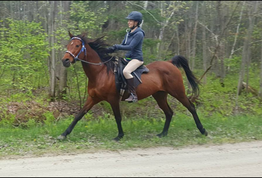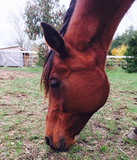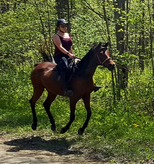
When I was a kid growing up reading every horse book I could lay my hands on, three things stuck in my brain as the most terrifying events that could happen to a horse owner. These were:
- breaking a leg in a groundhog hole;
- laminitis; and,
- colic.
I had never experienced any of these before, but in December I was introduced to colic.
On a cold day in early December Starlet was found laying down next to the hay bale. She was incredibly still, didn't move her head, and didn't want to get up. Neighbour Madison and hubby Bryan brought out blankets to cover her up - she wasn't wearing a blanket, which is usual for her - while I called the vet and raced home. By the time I got there Starlet had got up herself and Madison and Bryan had her in the barn.
The vet diagnosed Starlet with impaction colic. She used water in a nasogastric tube - distressing to watch, and probably pretty unpleasant to experience - to pump out Starlet's stomach. Once no more hay was coming out (and lots and lots of water had gone in), the vet left and we converted two cross-ties to a temporary stall.
- breaking a leg in a groundhog hole;
- laminitis; and,
- colic.
I had never experienced any of these before, but in December I was introduced to colic.
On a cold day in early December Starlet was found laying down next to the hay bale. She was incredibly still, didn't move her head, and didn't want to get up. Neighbour Madison and hubby Bryan brought out blankets to cover her up - she wasn't wearing a blanket, which is usual for her - while I called the vet and raced home. By the time I got there Starlet had got up herself and Madison and Bryan had her in the barn.
The vet diagnosed Starlet with impaction colic. She used water in a nasogastric tube - distressing to watch, and probably pretty unpleasant to experience - to pump out Starlet's stomach. Once no more hay was coming out (and lots and lots of water had gone in), the vet left and we converted two cross-ties to a temporary stall.

Here's where Starlet's temperament worked to her advantage: the vet gave instructions to walk Star for ten minutes every half hour and monitor her bowel movements. Starlet really, really dislikes being alone, so she walked herself in her stall pretty much constantly, with me checking on her every 15 minutes and going on walks with her every 30. She wasn't allowed to eat anything, but could drink as much as she wanted. After five very stressful hours, she pooped (yay!). Over the next 36 hours we very slowly introduced very tiny amounts of hay while continuing her walks every couple of hours, and she continued to pass stomach content. She was alert and a model patient, and rejoined her friends after 48 hours with no lasting harm.
Root cause analysis points to sudden and deep sub-freezing temperatures resulting in a decreased desire to drink water; compounded by the fact that the dummy horse owner (me) had forgotten to plug in the trough heater, making the water extra cold and unpleasant. Starlet's temperature was also low, so she probably lay down at some point on the cold ground and caught a bit of a chill in her bones (she's 19), also not encouraging her to get up and drink (or move around).
Root cause analysis points to sudden and deep sub-freezing temperatures resulting in a decreased desire to drink water; compounded by the fact that the dummy horse owner (me) had forgotten to plug in the trough heater, making the water extra cold and unpleasant. Starlet's temperature was also low, so she probably lay down at some point on the cold ground and caught a bit of a chill in her bones (she's 19), also not encouraging her to get up and drink (or move around).

Considering some people have stories of their horses not passing stomach contents for five DAYS (!), we really got off lucky with this incident. There are many reasons why a horse might get colic - the Internet is a great resource, if also extremely likely to make you paranoid - but access to warm water during colder temperatures seems to reduce the chance of colic. We also always make wet grain, but in the winter we make it extra soupy (and salty) to encourage more drinking. Hopefully I'll never see another horse in such distress.
